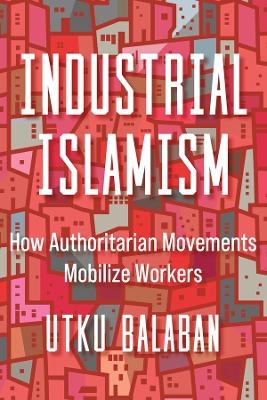
Industrial Islamism
How Authoritarian Movements Mobilize Workers
Seiten
2025
University of California Press (Verlag)
978-0-520-42253-7 (ISBN)
University of California Press (Verlag)
978-0-520-42253-7 (ISBN)
- Noch nicht erschienen (ca. Juli 2025)
- Versandkostenfrei innerhalb Deutschlands
- Auch auf Rechnung
- Verfügbarkeit in der Filiale vor Ort prüfen
- Artikel merken
A free ebook version of this title is available through Luminos, University of California Press’s Open Access publishing program. Visit www.luminosoa.org to learn more.
Industrial Islamism analyzes the relationship, since the end of the Cold War, between the rise of political Islamism in Muslim-majority countries and the rise of a new global "middle class" of industrial entrepreneurs. Challenging common assumptions, Utku Balaban questions the idea that political Islamism represents the antithesis of Western modernity and industrialization. On the contrary: the more enthusiastically a Muslim-majority country industrializes, the more "Islamized" its politics becomes.
The book focuses on Turkey, historically the most industrialized Muslim-majority country in the world, with the most successful Islamist movement and a relatively competitive electoral system. It provides a fine-grained historical and ethnographic analysis at the local level of urban-industrial control over workers in sweatshops and working-class neighborhoods by this new global middle class, whom Balaban calls the faubourgeoisie. As the central actor behind Turkey's post–Cold War industrialization, the faubourgeoisie allies with the Islamist movement to control its workers and significantly influence national politics.
Industrial Islamism analyzes the relationship, since the end of the Cold War, between the rise of political Islamism in Muslim-majority countries and the rise of a new global "middle class" of industrial entrepreneurs. Challenging common assumptions, Utku Balaban questions the idea that political Islamism represents the antithesis of Western modernity and industrialization. On the contrary: the more enthusiastically a Muslim-majority country industrializes, the more "Islamized" its politics becomes.
The book focuses on Turkey, historically the most industrialized Muslim-majority country in the world, with the most successful Islamist movement and a relatively competitive electoral system. It provides a fine-grained historical and ethnographic analysis at the local level of urban-industrial control over workers in sweatshops and working-class neighborhoods by this new global middle class, whom Balaban calls the faubourgeoisie. As the central actor behind Turkey's post–Cold War industrialization, the faubourgeoisie allies with the Islamist movement to control its workers and significantly influence national politics.
Utku Balaban is Associate Professor of Sociology in the Department of Race, Intersectionality, Gender, and Sociology at Xavier University. He is author of A Conveyor Belt of Flesh and Social Inclusion Policies in Turkey.
| Erscheint lt. Verlag | 22.7.2025 |
|---|---|
| Zusatzinfo | 19 color figures, 1 color map, 5 tables |
| Verlagsort | Berkerley |
| Sprache | englisch |
| Maße | 152 x 229 mm |
| Themenwelt | Geisteswissenschaften ► Geschichte ► Regional- / Ländergeschichte |
| Technik | |
| ISBN-10 | 0-520-42253-8 / 0520422538 |
| ISBN-13 | 978-0-520-42253-7 / 9780520422537 |
| Zustand | Neuware |
| Informationen gemäß Produktsicherheitsverordnung (GPSR) | |
| Haben Sie eine Frage zum Produkt? |
Mehr entdecken
aus dem Bereich
aus dem Bereich


